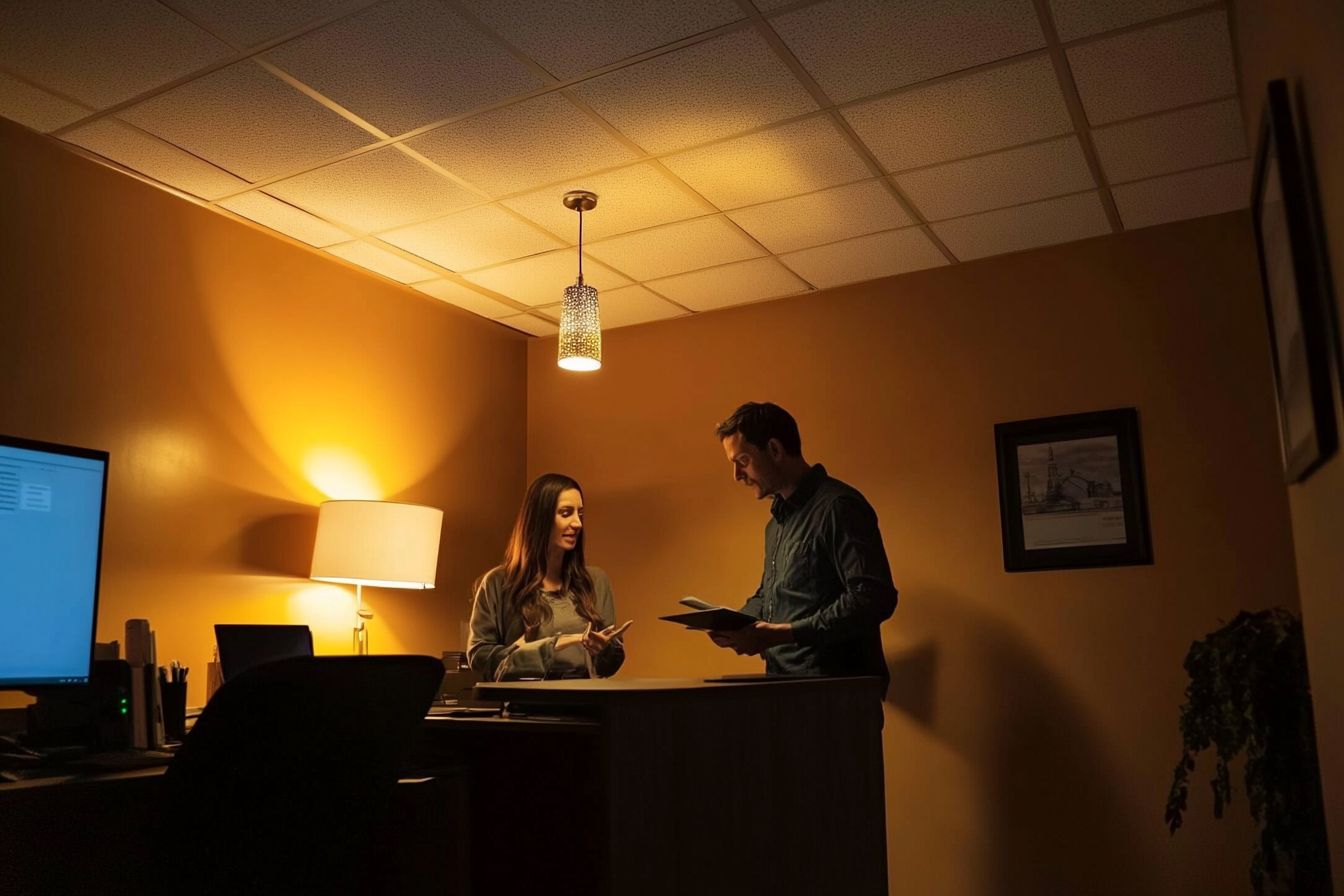Last updated on May 18th, 2025 at 03:01 pm
Buying a house comes with lots of questions. One big question is about the buyer’s agent fee. Let’s find out.

Buyer’s agent fees are the costs associated with hiring a real estate professional to assist in purchasing a property. They typically consist of a percentage of the home’s sale price, although alternative fee structures may also be utilized.
These Fees Defined
Buyer’s agent fees are what you pay your real estate pro for finding you a house. Think of it as their paycheck for all the hard work they do, from touring homes to sealing the deal.
This fee is part of the total commission paid in a real estate transaction. On average, these fees hover around 2.66%. So, if you’re buying a home priced at about $418,000, expect to shell out over $11,000 just for this expense.
These costs get wrapped into the deal when buying a property.
Most times, the seller covers them at closing. But know this: while it seems like you’re not paying directly, it influences how much sellers set their price tags.
The trick is understanding that every part of buying a home – including what goes to your buyer’s agent – plays into your final costs.
How are these agent Fees Structured
Buyer’s agent fees might seem like a puzzle at first. But once you know the pieces, it all fits together.
- The total commission is usually around 5.46% in 2023.
- This fee often gets split down the middle between the buyer’s and seller’s agents.
- So, if a house sells for $200,000 at a 5% commission, each side pockets $5,000.
- Then, this $5,000 goes further divided between the agent and their real estate brokerage.
- Some brokers might charge a flat fee instead of a percentage.
- The exact split can vary; sometimes it’s 50-50 or something else agreed upon between agents and their firms.
- Terms of the split are set out in a participation agreement before the sale starts.
- Innovative models exist too, where buyers can get part of the commission as a rebate.
- Market conditions and home prices influence how these fees are structured.
Knowing these parts helps buyers see where their money goes in real estate deals.
Who Pays It

In real estate transactions, the buyer’s agent fees are usually covered by the seller as part of the overall commission. However, there can be exceptions to this typical practice depending on various factors such as local market conditions and individual negotiations between parties involved.
General Practices in Real Estate Transactions
In most home sales, the seller usually pays the buyer’s agent fees at closing. This happens because of an agreement between real estate brokers. Most homes sold, about 86%, go through this kind of deal on platforms like Multiple Listing Service (MLS).
These platforms are where agents list houses for sale and offer to share their commission with the buyer’s agent.
Real estate transactions involve a dance of negotiations and agreements.
Agents from both sides work hard to make sure everyone gets a fair shake. The National Association of Realtors backs this practice up. It helps keep things smooth so that buyers can buy homes without worrying about extra fees.
Exceptions to the Norm
Sometimes, the way buyer’s agent fees get handled can throw you for a loop. In For Sale By Owner (FSBO) deals, the playbook changes. Traditionally, the seller pays these fees. But here, without an estate agent on their side, sellers might not feel like covering costs meant for buyers’ agents.
It turns into a negotiation game between buyers and their agents over who foots the bill. This shift makes understanding your contract more crucial than ever.
A surprising number of people think it’s always the buyer’s job to pay the agent. Yet, 62% of Americans are wrong about this detail. And while 55% of sellers don’t want to pay up, agreements in FSBO situations often lead to different setups for handling these fees.
Next up: exploring what roles a buyer’s agent actually plays.
The Role of a Buyer’s Agent

When buying property, the agent representing the buyer serves an essential purpose in educating and protecting their client.
In addition, buyer’s agents are proficient in the nuances of negotiation and transactional management. Agents ensure home buyers are making an educated decision through every step of the homebuyer process.
Market Analysis and Property Evaluation
A buyer’s agent digs deep into market data to find the right home for you. They use Comparative Market Analysis (CMA) reports. This looks at homes like the one you want and what they sold for.
It helps in figuring out a fair price. Think of it like doing homework before buying something big to make sure you get a good deal.
Knowing your market is half the battle in finding the perfect home.
They also help with property searches and showings. This means they go through listings, pick ones that match what you’re looking for, and then take you to see them. It’s like having a guide who knows exactly where the treasure is buried in a vast land of options.

Negotiation and Transaction Management
After figuring out the market value and picking the right house, it’s time for some serious talk. A buyer’s agent shines in negotiation and keeping things smooth until you get the keys.
They sit down with the selling side to make sure your offer stands out but doesn’t break the bank. It’s like having a coach who knows all the moves to score a win.
This pro also keeps an eye on all those pesky details at closing. They check every paper and make sure rules are followed to a T. Think of them as your guide through a jungle of legal stuff, making sure you don’t trip over anything that could delay moving into your new place.
With their help, signing those final papers feels less like homework and more like starting a new adventure.
The Value of Hiring an agent to represent you on the buyer’s side

When buying a home, having a buyer’s agent can provide expert guidance through the process. With access to exclusive listings and market analysis, they bring valuable insights for making informed decisions.
Buyer’s agents also play a critical role in negotiation and transaction management, ensuring that your interests are represented throughout the buying journey.
Access to Exclusive Listings
Having a buyer’s agent opens doors to homes you might not find on your own. Some properties are out of the public eye, only shared within networks of real estate agents. This means your agent can show you places that aren’t listed on major sites or in ads.
It’s like having a VIP pass to the housing market.
Finding the perfect home sometimes requires going off the beaten path.
Agents use tools like multiple listing services (MLS) and their professional connections to dig up these hidden gems. They assist in property searches, making sure no stone is left unturned.
By accessing exclusive listings, they can match you with a home that fits just right – often before it hits the open market.
Other times properties fall out of contract, and a good buyer’s agent can help grab it when it does.
Expert Guidance Through the Buying Process
A buyer’s agent brings a map to the maze of buying a home. They guide you from start to finish. First, they do their homework on prices and homes. This means less guesswork for you about how much to pay or offer.
They look at what houses sold for and compare it to the one you like.
They also deal with all the talking and paperwork when making offers. Imagine having someone handle all those calls and forms for you! They know what papers need signing and can explain them in simple terms.
Next, we’ll look at costs that might come up for buyers.
Cost Implications for the Buyer
These may encompass appraisal fees, home inspection costs, and property taxes. Recognizing these extra expenses is vital before embarking on the home buying process.
When Buyers Might Pay the Realtor Fees
Sometimes, buyers cover the agent’s fees. This often happens in FSBO (For Sale by Owner) deals. Here, without a listing agent involved, the buyer and their agent might need to talk about who pays what.
Also, new construction homes are different. Builders usually pay the buyer’s agent. But if terms change or agreements lack clarity, the buyer could end up paying.
In negotiations with sellers or builders, buyers can sometimes roll these fees into their home loan. This makes it possible not to pay out of pocket right away. Yet, this depends on the deal made and approval from lenders and underwriters involved in mortgages and home loans.
Potential Cost Savings and Rebates
Buyers can save on commission costs by working with companies like Clever, which offer reduced commission rates of 1.5% as opposed to the standard 2.5-3%. Furthermore, some agents and firms provide buyer rebates or cash back at closing, allowing buyers to recoup a portion of the agent’s fee.
These cost savings and rebates are valuable incentives for buyers seeking to make their home purchase more affordable.
Working with companies that buy houses can save buyers up to 6% in commission costs.
The Changing Landscape of Buyer’s Agent Fees
The fees for buyer’s agents are changing due to new trends in commission structures and the current state of the market. Important factors like average home prices and antitrust laws greatly influence how these fees are adjusted.
As housing prices and legal rules shift, they play a key role in determining what buyers end up paying their agents.
Trends and Innovations in Commission Structures
Real estate is seeing big changes in how commissions work. By mid August of 2024, compensation schemes for agents are likely going to have more flexibility as well.
This shift is happening after a lawsuit settlement in 2023, which suggests buyer’s agent commissions might change. These changes could really affect buyer interactions with agents and also end up affecting the whole cost that someone spends on buying a house.
Because of all these shifts happening, real estate companies and agents may have to rethink their plans and look for new ways to clinch better deals for their commissions as well.
These trends are still unfolding, so staying adaptable and informed is crucial for everyone involved in the real estate market.
Impact of Market Conditions on Fees
The influences of market conditions, like the property demand, supply levels, and economic factors, strongly shape buyer’s agent fees.
In a high-demand market with low inventory, agents may have more leverage to negotiate higher fees due to intense competition among buyers.
Conversely, in a buyer’s market where supply exceeds demand, agents might be inclined to lower their fees as they compete for business.
These fluctuations directly affect the median sales price of homes in the U.S., which stood at $384,500 in April 2024 and impacts average realtor fee structures hovering around 6%.
This relationship between market dynamics and commission rates underscores how economic forces play into setting these charges.
How to Negotiate
When negotiating buyer’s agent fees, understanding the strategies for fee negotiation and the legal considerations involved is essential. This can help you successfully navigate this aspect of real estate transactions and uncover the secrets to doing so effectively.

Strategies for Fee Negotiation
- Research Comparable Fees: Conduct market research to understand the typical range of fees charged by buyer’s agents in your area.
- Discuss Performance-Based Fees: Negotiate a fee structure that ties payment to specific achievements, such as successful negotiation of a lower purchase price or favorable contract terms.
- Leverage Multiple Offers: If you’re considering several properties or have multiple potential transactions, use this as leverage to negotiate lower fees based on increased business volume.
- Highlight Competitive Offerings: If another agent is willing to provide comparable services at a lower cost, use this as a negotiating point to secure more favorable terms.
- Emphasize Long-Term Potential: If you plan on future real estate transactions, convey this to the agent and negotiate reduced fees based on potential long-term business.
- Explore Value-Added Services: Discuss the possibility of having certain additional services included within the standard fee structure rather than paying for them separately.
- Consider Your Role in the Process: If you intend to take on certain responsibilities during the buying process, negotiate reduced fees based on your level of involvement.
- Review the Contract Thoroughly: Ensure that all negotiated fee changes are clearly outlined in the contract before signing any agreements or making any commitments.
Negotiating fees with your buyer’s agent can ultimately lead to a mutually beneficial arrangement while maximizing value for both parties involved in the transaction.
Legal Considerations
Legal considerations regarding buyer’s agent fees are significant. It is important for buyers to comprehend the legal aspects of these fees. In March 2024, the National Association of Realtors (NAR) resolved a lawsuit for $418 million over four years.
Grasping the consequences of this settlement on buyer’s agent fees for both buyers and agents involved in real estate transactions is paramount.
Also important are legal duties that agents owe to their clients—and there are important fiduciary duties they have to perform. They have to act with a sense of loyalty and respect, protect any confidential information they have and share important details with their clients that could impact their decisions.
They have to follow the rules and requirements, abide by reasonable care and be diligent and hard working.
Agents really should list out any potential conflicts of interest or dual agency that might happen when we’re buying or selling houses. It’s really important to be totally transparent and upfront about that.
Bottom Line
When it comes to the realm of real estate, understanding buyer’s agent fees is necessary. It forms the basis of who eventually shoulders the cost and whether it impacts a homebuyer’s finances.
If you have a house you want to sell quickly, let us give you a quote.
As changes approach, these details become increasingly important in the world of property transactions.
